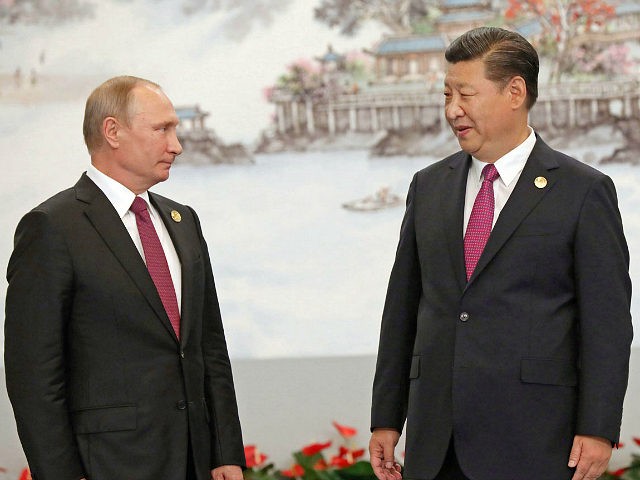North Korea’s primary patrons, China and Russia, are urging restraint and patience as rhetorical exchanges between Washington and Pyongyang grow more heated.
CNBC quotes Russian media reports that the Foreign Ministry claims to be “working behind the scenes” to arrange a political solution for the North Korean missile crisis.
“Cited by RIA, Mikhail Ulyanov, the head of the non-proliferation and arms controls department at Russia’s foreign ministry, also said the U.S. approach to North Korea was a dead end and the tool of sanctions against the North had almost been exhausted,” CNBC reports.
This is consistent with statements from top officials in Moscow, including President Vladimir Putin, that sanctions are virtually useless against North Korea. Russia did, however, support the last round of United Nations sanctions against Pyongyang.
As Hannah Thoburn recently noted at The Atlantic, Russia has a vested interest in proving sanctions do not work since Russia is the target of sanctions itself. “For Russia, sanctions that successfully force North Korea either to alter its military choices or lead to a change in its leadership would set a dangerous precedent – the possibility of regime change anywhere is never to be encouraged,” she wrote.
The urgent question is what Russia might be able to do “behind the scenes” to persuade the North Korean regime to give up on its nuclear missile program after numerous strident declarations that it will never do so.
Al-Jazeera speculates that Moscow might offer Pyongyang “economic benefits in exchange for scaling back its nuclear program,” which would also fit into Russia’s plan to make itself more of a player in the Pacific and perhaps even woo North Korea away from its strained partnership with China.
One might ask why anybody would want the psychotic Kim regime as a friend, but The Diplomat points out that North Korea has money to spend on Russian weapons and energy resources and would benefit strategically from any shifting allegiance that makes China less dominant in the region.
Russia seems determined to make clear it will be the big brother in any prospective bromance with North Korea. The Russians launched a massive aerial drill near the Chinese and North Korean borders on Tuesday, featuring top-shelf fighters and bombers.
“During the practical stage of the drill, Su-35 and Su-30 pilots will serve as cover for Su-24M2 during overflight in a bomb deployment region. Besides this, aviators from Su-35 and Su-30SM from Khabarovsk region will practice elements of aerial combat at various heights, carry out search and escort and interception of jets of a hypothetical enemy whose role will be played by jets from Primorye,” read a statement from the Russian military, which remained coy about who the simulated targets of all this simulated bombing and intercepting might be.
Newsweek notes that Russia has denied moving additional ground troops to the North Korean border, to either forestall a potential refugee crisis from a defeated Kim regime or put troops in position to grab nuclear and chemical weapons if Pyongyang should fall.
Meanwhile, Beijing, which passes many a sleepless night worrying about refugees fleeing across its even larger border with North Korea, is advising all sides not to “add oil to the flames” of the Pyongyang missile crisis.
“We want things to calm down. It’s getting too dangerous and it’s in nobody’s interest,” said China’s ambassador to the United Nations, Liu Jieyi.
Liu said China hopes the U.S. and North Korea “will see that there is no other way than negotiations to solve the nuclear issue on the Korean Peninsula … the alternative is a disaster.”
Foreign Ministry spokesman Lu Kang told reporters on Tuesday that a war on the Korean Peninsula would have “no winner” and would be a “tragedy for regional countries.”
“Given our consistent opposition to the war and chaos on the peninsula, we totally disapprove of an escalation of the war of words between the U.S. and North Korea,” said Lu.
The Wall Street Journal reports that China ended a five-month pause in North Korean coal imports just in time to beat a United Nations ban on the North Korean coal industry. The Chinese Foreign Ministry promised to “strictly implement” all relevant U.N. resolutions, although its latest receipt of North Korean coal is likely to anger the United States.
“China may have decided to back away from an aggressive enforcement of sanctions, and apply a degree of pressure closer to the minimum requirements stipulated by U.N. resolutions. As international sanctions against North Korea trend toward a comprehensive trade ban, China was likely worried about the impact on the North Korean economy,” Zhao Tong of the Carnegie-Tsinghua Center for Global Policy in Beijing speculated to the Journal.

COMMENTS
Please let us know if you're having issues with commenting.